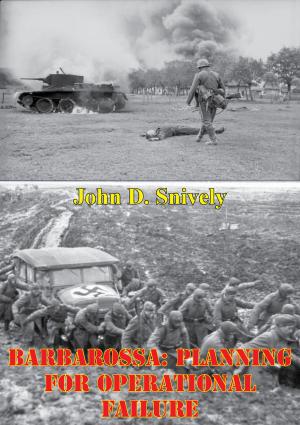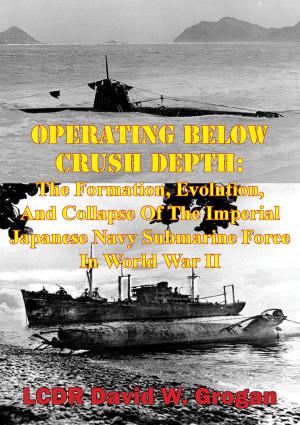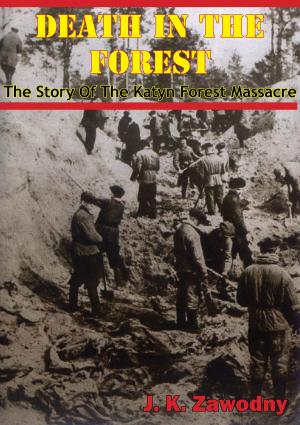American Prisoners Of Japan: Did Rank Have Its Privilege?
Nonfiction, History, Germany, European General, Military, United States| Author: | Major Michael A. (Buffone) Zarate | ISBN: | 9781782895749 |
| Publisher: | Verdun Press | Publication: | August 15, 2014 |
| Imprint: | Verdun Press | Language: | English |
| Author: | Major Michael A. (Buffone) Zarate |
| ISBN: | 9781782895749 |
| Publisher: | Verdun Press |
| Publication: | August 15, 2014 |
| Imprint: | Verdun Press |
| Language: | English |
This thesis examines the story of American POWs held by the Japanese in WWII to see if there were significant differences in treatment based on rank. It examines how the Japanese treated the prisoners according to international law and also distinctions made by the officers themselves simply because of higher rank.
The thesis begins by discussing the historical framework for POW rank distinctions by looking at past wars and the development of rank distinctions in international rules. It then covers the American WWII POW experience in the Far East from Bataan and Corregidor to the war’s end.
Special emphasis is placed on distinctions made in food, housing, pay, medical care, camp administration, work requirements, escape opportunities, transportation, leadership problems, and overall death rates.
The study concludes that there were significant differences in treatment based on rank. These differences caused extremely high enlisted death rates during the first year of captivity. The officers fared worse as a group, however, because the Japanese held them in the Philippines until late 1944 because international rules prevented the Japanese from using officers in Japan’s labor camps. During shipment to Japan many officers died when the unmarked transport ships were sunk by advancing American forces.
This thesis examines the story of American POWs held by the Japanese in WWII to see if there were significant differences in treatment based on rank. It examines how the Japanese treated the prisoners according to international law and also distinctions made by the officers themselves simply because of higher rank.
The thesis begins by discussing the historical framework for POW rank distinctions by looking at past wars and the development of rank distinctions in international rules. It then covers the American WWII POW experience in the Far East from Bataan and Corregidor to the war’s end.
Special emphasis is placed on distinctions made in food, housing, pay, medical care, camp administration, work requirements, escape opportunities, transportation, leadership problems, and overall death rates.
The study concludes that there were significant differences in treatment based on rank. These differences caused extremely high enlisted death rates during the first year of captivity. The officers fared worse as a group, however, because the Japanese held them in the Philippines until late 1944 because international rules prevented the Japanese from using officers in Japan’s labor camps. During shipment to Japan many officers died when the unmarked transport ships were sunk by advancing American forces.

![Cover of the book A War of Their Own: Bombers Over the Southwest Pacific [Illustrated Edition] by Major Michael A. (Buffone) Zarate](https://www.kuoky.com/images/2014/august/300x300/9781782899266-HdAC_300x.jpg)

![Cover of the book NEW ZEALAND DIVISION 1916-1919. The New Zealanders In France [Illustrated Edition] by Major Michael A. (Buffone) Zarate](https://www.kuoky.com/images/2014/june/300x300/9781782892427-VkWo_300x.jpg)

![Cover of the book Samurai! [Illustrated Edition] by Major Michael A. (Buffone) Zarate](https://www.kuoky.com/images/2014/august/300x300/9781782898382-n6aB_300x.jpg)
![Cover of the book Attack Transport; The Story Of The U.S.S. Doyen [Illustrated Edition] by Major Michael A. (Buffone) Zarate](https://www.kuoky.com/images/2015/november/300x300/9781786252630-aDmV_300x.jpg)
![Cover of the book Marines In World War II - Bougainville And The Northern Solomons [Illustrated Edition] by Major Michael A. (Buffone) Zarate](https://www.kuoky.com/images/2014/august/300x300/9781782892786-VZXx_300x.jpg)


![Cover of the book Marines In World War II - The Campaign On New Britain [Illustrated Edition] by Major Michael A. (Buffone) Zarate](https://www.kuoky.com/images/2014/august/300x300/9781782892823-UYPK_300x.jpg)




![Cover of the book Conversations With A Stuka Pilot [Illustrated Edition] by Major Michael A. (Buffone) Zarate](https://www.kuoky.com/images/2014/august/300x300/9781782898450-BiYs_300x.jpg)